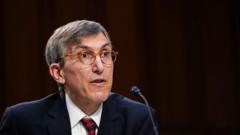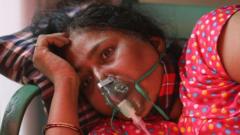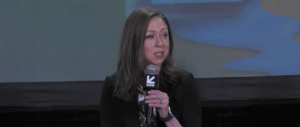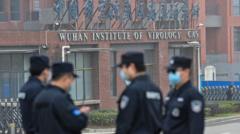In a tense confirmation hearing on Wednesday, Robert F. Kennedy Jr., nominated by President Trump for the pivotal role of Health Secretary, faced rigorous questioning from senators regarding his previous remarks about vaccines, abortion, and food safety. Despite interruptions from protesters, Kennedy garnered audience support for his commitment to enhancing public health in America. Here are the top five insights from the hearing.
**RFK Jr. Faces Senate Scrutiny During Confirmation Hearing for Health Secretary**
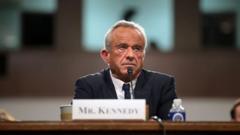
**RFK Jr. Faces Senate Scrutiny During Confirmation Hearing for Health Secretary**
Robert F. Kennedy Jr. confronted challenging questions and a divided response at his first confirmation hearing as President Trump's nominee for Health Secretary, focusing on his past comments about vaccines and public health policies.
Kennedy's Vaccine Controversies
During the hearing, Kennedy's history of skepticism towards vaccines was a focal point. Senators pressed him to clarify statements from his tenure with Children's Health Defense, where misinformation about vaccine safety has circulated. Kennedy claimed he is not anti-vaccine and emphasized the need for thorough safety evaluations but acknowledged past comments that suggested vaccines do not guarantee safety or effectiveness. He attributed some of his controversial assertions to being taken out of context.
Addressing US Food Industry Concerns
Kennedy vehemently criticized the American food industry’s processed foods, citing their role in the obesity crisis. He articulated plans to investigate food additives and eliminate conflicts of interest between federal agencies and food manufacturers. He emphasized that while he aims to promote nutritional awareness, he would not restrict access to processed foods for consumers, echoing President Trump's known culinary preferences.
His Abortion Stance Under Fire
The nominee confronted sensitive inquiries regarding his views on abortion, particularly his past pro-choice stance. Both Democrat and Republican senators questioned him on potential reinstatement of conscience protections for medical professionals opposed to abortion. Kennedy stated, "Every abortion is a tragedy," and pledged to follow President Trump's directives on the issue, leading to accusations from Democrats that he was compromising his values for political alignment.
Debate on Healthcare Rights
In a notable exchange with Senator Bernie Sanders, Kennedy hesitated to categorically support universal healthcare as a human right, using hypothetical examples to illustrate his point. Sanders pushed Kennedy on healthcare access disparities and corporate pricing, to which Kennedy responded affirmatively, advocating for ending such inequalities.
Divided Reception
The atmosphere during the hearing reflected stark partisan divides. While Republican senators praised Kennedy's public health initiatives, Democratic senators raised alarms over his history of promoting vaccine misinformation and challenged his competence and readiness to lead in public health. Following the hearing, Kennedy is scheduled for a second round of questioning to further assess his qualifications before a formal vote by the Senate.
As RFK Jr.'s nomination processes, the implications of his confirmation could reverberate through national health policies for years to come.
During the hearing, Kennedy's history of skepticism towards vaccines was a focal point. Senators pressed him to clarify statements from his tenure with Children's Health Defense, where misinformation about vaccine safety has circulated. Kennedy claimed he is not anti-vaccine and emphasized the need for thorough safety evaluations but acknowledged past comments that suggested vaccines do not guarantee safety or effectiveness. He attributed some of his controversial assertions to being taken out of context.
Addressing US Food Industry Concerns
Kennedy vehemently criticized the American food industry’s processed foods, citing their role in the obesity crisis. He articulated plans to investigate food additives and eliminate conflicts of interest between federal agencies and food manufacturers. He emphasized that while he aims to promote nutritional awareness, he would not restrict access to processed foods for consumers, echoing President Trump's known culinary preferences.
His Abortion Stance Under Fire
The nominee confronted sensitive inquiries regarding his views on abortion, particularly his past pro-choice stance. Both Democrat and Republican senators questioned him on potential reinstatement of conscience protections for medical professionals opposed to abortion. Kennedy stated, "Every abortion is a tragedy," and pledged to follow President Trump's directives on the issue, leading to accusations from Democrats that he was compromising his values for political alignment.
Debate on Healthcare Rights
In a notable exchange with Senator Bernie Sanders, Kennedy hesitated to categorically support universal healthcare as a human right, using hypothetical examples to illustrate his point. Sanders pushed Kennedy on healthcare access disparities and corporate pricing, to which Kennedy responded affirmatively, advocating for ending such inequalities.
Divided Reception
The atmosphere during the hearing reflected stark partisan divides. While Republican senators praised Kennedy's public health initiatives, Democratic senators raised alarms over his history of promoting vaccine misinformation and challenged his competence and readiness to lead in public health. Following the hearing, Kennedy is scheduled for a second round of questioning to further assess his qualifications before a formal vote by the Senate.
As RFK Jr.'s nomination processes, the implications of his confirmation could reverberate through national health policies for years to come.
















